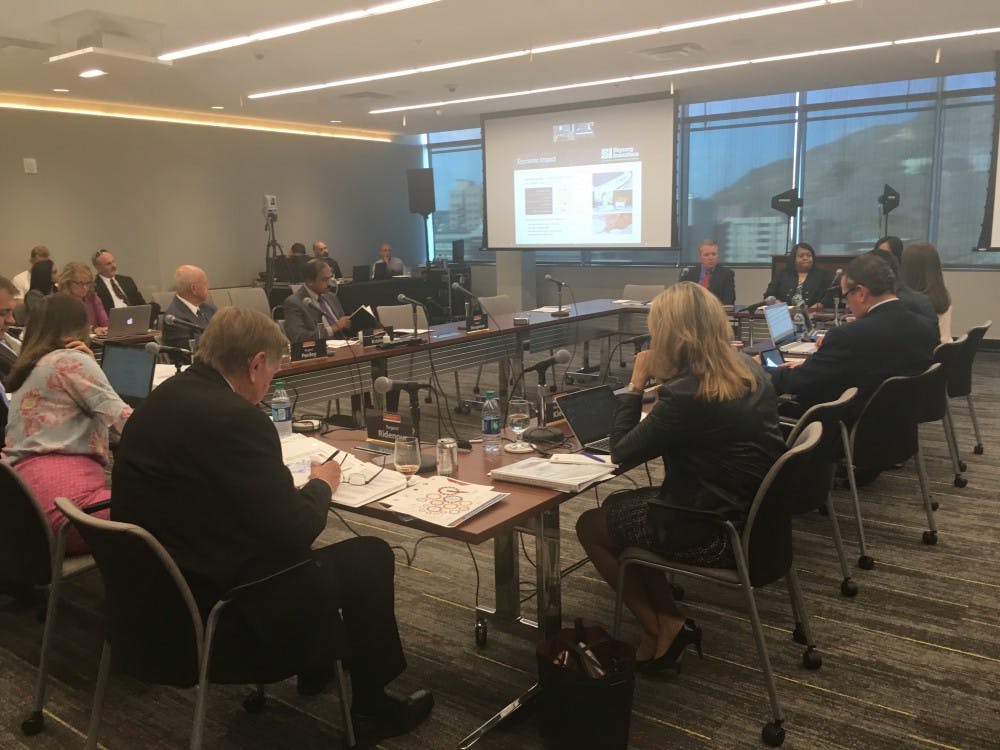The Arizona Board of Regents met at the Fulton Center Thursday for a committee board meeting where faculty and staff members from all three Arizona public universities discussed new degree programs at ASU and the graduation rates of community college transfer students.
Mark Searle, ASU's Executive Vice President and University Provost, presented five new undergraduate bachelor degree programs and eight new graduate programs for the University's 2018-19 school year at the meeting.
The programs include:
- Bachelor of Science in Digital Audiences
- Bachelor of Arts in Disability Studies
- Bachelor of Science in Population Health
- Bachelor of Arts in Education in Special Education
- Bachelor of Science in Computational Forensics
- Master of Arts in World War II Studies
- Master of Arts in Political Psychology
- Master of Science in Auditory and Language Neuroscience
- Master of International Health Management
- Master of Science in Digital Audience Strategy
- Master of Science in Modern Energy Production and Sustainable Use
- Master of Science in Graphic Information Technology
- Professional Science Masters in Forensic Science
All of the programs except the BA in Disability Studies passed.
Searle said the degree in disability resources was a combination of arts, humanity, social science and looking at the issues that people with disabilities face.
Regent Larry Penley challenged the report ASU presented, stating that while addressing disability resources was important, he struggled with the learning outcomes presented.
“I struggle with whether those learning outcomes really articulate something students or prospective students can legitimately understand,” Penley said.
The degree was described as a combination of theory and practice to prepare students to address injustices, exclusions and misapprehensions regarding disabilities through advocacy, education, knowledge of the law and historical awareness. Those seeking the degree could pursue careers in business, policy and advocacy, social work, education, government, community and non‐governmental organizations, according to the presented learning outcomes.
“The demand in this space is quite intense in terms of interest and opportunity for students,” Searle said in defense of the program.
Penley said he could not vote for a degree he did not fully understand, so the first proposal to pass all thirteen of ASU's degrees failed. It passed the second time with the exception of the BA in Disabilities Studies. The program will go up for review in the next ABOR meeting.
The Academic and Students Affairs meeting also discussed student transfer rates from Arizona community colleges to the three universities.
Students who transferred with 60 or more transfer credits had the highest chance of graduating. These students had a 52.8 percent chance of graduating, according a presentation from Kelly Robles with AZ Transfer.
She said the program will now be using a blackbox theory, modeled after the aviation industry, that focuses on reviewing the transfer programs' failures rather than their successes.
“We are embarking just this year on this critical analysis of those students that haven’t been successful, those that say they want to transfer but aren’t transferring and those that do transfer but aren’t graduating, and we're trying to identify any common behaviors or indicators that might better inform our processes," Robles said.
The board will meet again for their Regents Executive Committee meeting again on Nov. 8.
Correction: A previous version of this story omitted a word in the first paragraph. The mistake has been corrected.
Reach the reporter at bkhanrah@asu.edu and follow @brookehanrahan1 on Twitter.
Like The State Press on Facebook and follow @statepress on Twitter.




